“My Self In A Transitional State”: Isherwood in California
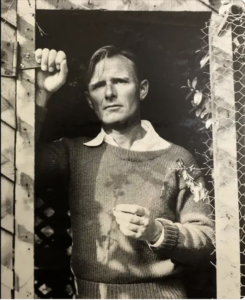
November 12-14, 2015
Rothenberg Hall, The Huntington
Christopher Isherwood settled in Los Angeles in 1939 and would live there for the rest of his life. This was the definitive actin in Isherwood’s effort to reimagine himself, his spirituality, his personal freedom, and his place in the modern world. International scholars will explore the significance of memoir, film, and biography in order to reconstruct Isherwood’s place in contemporary culture and literary history.
A lecture titled “My Logical Grandfather” was held on November 12 by Armistead Maupin, American activist and LGBT activist, who reflected reflects on his friendship with Christopher Isherwood and the impact of Isherwood’s cultural leadership.
From November 13-14, a conference was held at The Huntington with scholars discussing Isherwood starting with reconsidering him in the 1950’s and 60’s moderated by ICW Director William Deverell, to his spiritual life, his queer self, and his impact on the 21st century. Listen to the recordings available on Apple Podcasts made available by The Huntington.
This programming was brought to you by The Christopher Isherwood Foundation with the support of The Huntington’s William French Smith Endowment and the Huntington-USC California and the West.
_________________________________________________________________________
Sporting Guide: Los Angeles, 1897
ICW In Conversation with Liz Goldwyn
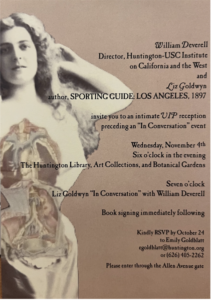
November 4, 2015
The Huntington
Author and filmmaker Liz Goldwyn discusses her book Sporting Guide, a series of interlinked stories that evoke a lost world on the margins of Los Angeles society in the 1890s. Long before the glitz and glamour of Hollywood, Los Angeles was a city where dreamers came to make their fortunes—and where a madam named Pearl Morton entertained the city’s most powerful politicians and entrepreneurs inside her namesake brothel. William Deverell, director of ICW, talks with Goldwyn about her research (much of it conducted at The Huntington) and about the creative process that fictionalizes the real-life people and events of a tumultuous era. A book signing followed the program.
-
Liz Goldwyn is a writer, filmmaker, and artist living and working in Los Angeles. She is the writer and director of the documentary Pretty Things (HBO, 2005) based on her non-fiction book Pretty Things: the Last Generation of American Burlesque Queens, (HarperCollins 2006 Hardcover, 2010 Paperback). Goldwyn’s short films include Underwater Ballet (2008), LA at Night (2009), The Painted Lady (2012) and Dear Diary (2013).
Goldwyn was New York Editor of French Vogue from 2001 to 2002 and has contributed to publications including the New York Times Magazine, the Financial Times, British Vogue and C Magazine. In September 2014 she became the first guest editor of Town & Country in its’ 168-year history.
She has been commissioned as an artist and designer by M.A.C Cosmetics, Van Cleef & Arpels, Altamont Apparel, and Le Bon Marché and has created jewelry for feature films including Running With Scissors (2006).
Tangled Vines: Greed, Murder, Obsession, and an Arsonist in the Vineyards of California
ICW In Conversation with Frances Dinkelspiel
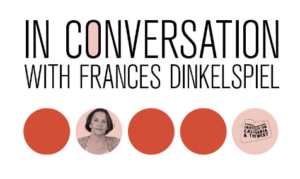
November 2, 2015
Munger Research Center, Seaver Classrooms, The Huntington
Author Frances Dinkelspiel discusses her book Tangled Vines, which centers around a 2005 arson fire in a wine storage warehouse. Around 4.5 million bottles of fine wine worth $250 million were destroyed, making it the largest crime involving wine in history. She engages in discussion with William Deverell, director of ICW, about how she traces the history of some of these bottles, 175 of which were made by Isaias Hellman, her great-great grandfather, in 1875 which came from a vineyard in Rancho Cucamonga in San Bernardino County.
This conversation is part of a brown bag luncheon series sponsored by ICW.
-
Frances Dinkelspiel is an award-winning journalist who cofounded the local news site Berkeleyside. Her work has appeared in the New York Times, Wall Street Journal, Los Angeles Times, People magazine and elsewhere. Her first book Towers of Gold: How One Jewish Immigrant Named Isaias Hellman Created California was a San Francisco Chronicle bestseller and was named a Best Book of 2008 by the newspaper. Her second book, Tangled Vines: Greed, Murder, Obsession, and an Arsonist in the Vineyards of California was published in October 2015.
ICW Commemorates Ten Years of the West 2004-2014
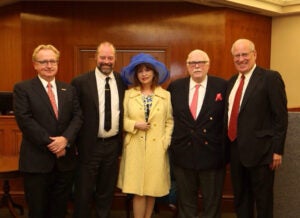
October 28, 2015
The Huntington
ICW friends and supporters gathered at The Huntington to commemorate and celebrate a decade of work aimed at understanding the history and culture of California and the American West. Nearly a hundred guests chatted for an hour over cocktails and snacks in the magnificently re-done “bamboo court” inside the library complex. We then moved into the Ahmanson Rare Reading Room, where USC Dornsife Dean Steve Kay and Huntington President Steve Koblik welcomed the audience and touched upon some highlights of the ten years’ of ICW’s work and outreach. Patt Morrison of the Los Angeles Times then moderated a discussion between herself, USC University Professor Kevin Starr, and ICW Director Bill Deverell, after which audience members were invited to ask questions of the group. The evening ended back in the courtyard with desserts and more conversation.
We are so grateful to our guests and supporters—all of you who have made a decade go back quickly and with excitement, and all of you who will help us reach our research, teaching, and outreach goals over the next ten years. Warmest and special thanks to the ten-year event team: Cynthia Gellis, Doug Colby, Chris Wiedey, Hally Prater, Randy Shulman, Jessica Ashbrook, and Sarah Krupczak.
Our work goes on!
Read the article written about the Institute’s ten-year anniversary.
_________________________________________________________________________
Gendered Borderlands
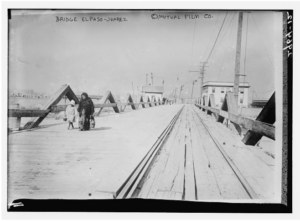
October 10, 2015
Huntington Library
Join ICW and leading scholars in the field of borderlands studies for a roundtable on the ways in which borders are shaping gender identities and opening opportunities for the renegotiation of femininity, masculinity, and family dynamics along the U.S.-Mexico Border.
Often focused on the history of capital, labor, and immigration, borderlands historians are also calling attention to the gendered dimensions of border crossing. Recent work by scholars in the field are raising and addressing questions of state power and gender and sexuality in border regions as well as the ways in which border relationships reshape gender identities or open opportunities for the renegotiation of femininity, masculinity, and family dynamics.
-
Leisy J. Abrego is a Professor in Chicana/o Studies at UCLA. She is a member of the first large wave of Salvadoran immigrants who arrived in Los Angeles in the early 1980s.
Her research and teaching interests—inspired in great part by her family’s experiences—are in Central American immigration, Latina/o families, the inequalities created by gender, and the production of “illegality” through U.S. immigration laws. Her award-winning first book, Sacrificing Families: Navigating Laws, Labor, and Love Across Borders (Stanford University Press, 2014), examines the well-being of Salvadoran immigrants and their families—both in the United States and in El Salvador—as these are shaped by immigration policies and gendered expectations. Her early research examines how immigration and educational policies shape the educational trajectories of undocumented students. Her second book, Immigrant Families (Polity Press, 2016), is co-authored with Cecilia Menjívar and Leah Schmalzbauer and delves deeply into the structural conditions contextualizing the diverse experiences of contemporary immigrant families in the United States. More recently, Abrego has been writing about how different subsectors of Latino immigrants internalize immigration policies differently and how this shapes their willingness to make claims in the United States. Her current project examines the day-to-day lives of mixed status families after DACA. Her scholarship analyzing legal consciousness, illegality, and legal violence has garnered numerous national awards. She also dedicates much of her time to supporting and advocating for refugees and immigrants by writing editorials and pro-bono expert declarations in asylum cases.
-
Miroslava Chávez-García is Professor of History at the University of California, Santa Barbara, and holds affiliations in the Departments of Chicana/o Studies and Feminist Studies as well as Iberian and Latin American Studies. She also currently serves as the Faculty Director of the McNair Scholars Program.
Author of Negotiating Conquest: Gender and Power in California, 1770s to 1880s (Tucson, 2004) and States of Delinquency: Race and Science in the Making of California’s Juvenile Justice System (Berkeley, 2012), Miroslava’s most recent book, Migrant Longing: Letter Writing across the U.S.-Mexico Borderlands (Chapel Hill, 2018), is a history of migration, courtship, and identity as told through more than 300 personal letters exchanged across the U.S.-Mexico borderlands among family members and friends. Most recently, in 2020, the book was selected as a 2019 Choice Outstanding Academic Title and in 2019 it won the Western Association of Women’s Historians Barbara “Penny” Kanner Award to honor the book that illustrates the use of a specific set of primary sources (such as diaries, letters, and interviews). Her essay, “Migrant Longing, Courtship, and Gendered Identity in the U.S.-Mexico Borderlands,” published by the Western History Quarterly in Summer 2016, received the 2017 Western Association of Women’s Historians Judith Lee Ridge prize and the 2017 Bolton-Cutter Award from the Western History Association for the best article on Spanish Borderlands history.
-
Celeste Menchaca is Assistant Professor of History at the University of Southern California. She received her Ph.D. in American Studies and Ethnicity at University of Southern California in 2016. Prior to coming to USC, she was the Assistant Professor of History at Texas Christian University from 2016-2020. She has published several articles including ‘The Freedom of Jail’: Women, Detention, and Immigration Governance along the U.S.-Mexico Border, 1903-1917 (2020) and Staging Crossings: Policing Intimacy and Performing Respectability at the U.S.-Mexico Border, 1907-1917 (2020).
-
Verónica Castillo-Muñoz is an Associate Professor in the Department of History at the University of California, Santa Barbara. She is an interdisciplinary scholar with training in Gender history, Latin America, and U.S. history. She has written widely on the intersections between gender, family migration, and the U.S.-Mexico borderlands. Her research has been funded by a Fulbright Garcia-Robles Fellowship, an NEH Huntington Library Fellowship, the Hellman Foundation, and the UC President’s Faculty Fellowship in the Humanities.
Castillo-Muñoz is the author of the book, The Other California: Land Identity and Politics on the Mexican Borderlands, published by the University of California Press (2017). This book examines how communities of laborers changed the racially and ethnically diverse social landscape of the Mexico-U.S. borderlands. Focusing on Baja California, this book is the first to examine the interplay of land reform and migratory labor and how global migrants and Mexican workers transformed the Mexico-U.S. borderlands between the years of 1850 and 1954. Previous research on migration and border crossings portrays the Mexican borderlands as a temporary place for transitory labor, a launching pad to enter the United States. This book argues that the present-day Mexican borderlands emerged from efforts to keep Mexican labor moving across the U.S. border while fixing national communities in place. This intricate interplay shows how governments, foreign investors, and local communities, engaged in the making of the Baja California borderlands, leading to the booming cities of Tijuana, Mexicali, and Santa Rosalia.
-
Anne Reid is Assistant Professor of History at California State University, San Luis Obispo. She received her Ph.D. in American Studies and Ethnicity at University of Southern California. She specializes in US and Latin American History, Borderlands, and Gender. Her research and special interests are in Spanish California, colonial Mexico, and the North American borderlands, with particular interest in gender, medicine, sickness, and indigenous cultures.
“Deep LA”: A Graduate History Conference
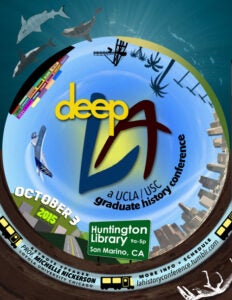
October 2-3, 2015
History Department Conference Room, UCLA & Ahmanson Classroom, Botanical Center, The Huntington
“Deep L.A.” is a call to reconsider the intellectual, cultural, and historiographical conceits that have informed the narration of Southern California’s storied past. The graduate scholars and keynote speaker Michelle Nickerson have explored, in multiple valences, what constitutes a deep historical practice in and on the Los Angeles region. Deep is a call to follow the flow of waterways, trace the choreographies of collective movements, examine the intimate transformations of space, interrogate the very materiel that forms the basis of our historical knowledge.
Deep L.A. has received generous support from The Huntington Library, the USC Department of American Studies and Ethnicity, and the UCLA Department of History.
-
Michelle Nickerson is an Associate Professor of History at Loyola University Chicago. She teaches courses on the history of women and gender, U.S. politics, social movements, cities and suburbs, and American religion.
In 2012 she published Mothers of Conservatism: Women and the Postwar Right (Princeton University Press),which documents the grassroots activism of conservative women in Cold War Los Angeles and explores the impact of that activism on the emerging American right. She also co-authored a volume of essays called Sunbelt Rising: The Politics of Place, Space, and Region (University of Pennsylvania Press). Nickerson is currently currently finishing her latest book on the history of religion and politics in the long 1960s called, “Spiritual Radicals: How the Camden 28 put the Vietnam War on trial, which will be published by the University of Chicago Press.
“Zealous Romantics: The Progressive Era and the Naïveté of Legal Aid Reformers”
ICW In Conversation with Shaun Ossei-Owusu
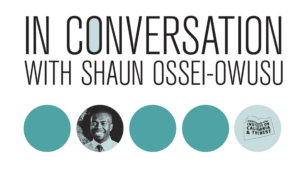
September 17, 2015
Munger Research Center, Seaver Classrooms, The Huntington
Author Shaun Ossei-Owusu discusses his manuscript “Zealous Romantics: The Progressive Era and the Naïveté of Legal Aid Reformers” with ICW Director William Deverell.
This conversation is part of a brown bag luncheon series sponsored by ICW.
-
Dr. Shaun Ossei-Owusu is the Doheny Postdoctoral Fellow at the Huntington-USC Institute on California and the West and USC Libraries at the University of Southern California. He received his PhD from the Department of African American Studies at the University of California, Berkeley in 2014. He also received his graduate degree from the University of Pennsylvania and his undergraduate degree from Northwestern University. He is currently working on a book manuscript on the historical development of legal aid institutions and a project on public health in post-1970 South Los Angeles. The National Science Foundation and the American Bar Foundation have funded his scholarly research and his writings have appeared in Salon, Huffington Post, The Root, and Jacobin.
Americus: The Historical Novel & the Present Historical Moment
ICW In Conversation with Michael Datcher
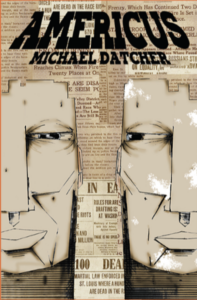
June 16, 2015
Munger Research Center, Seaver Classrooms, The Huntington
Author Michael Datcher discusses his book Americus: The Historical Novel & the Present Historical Moment with ICW Director William Deverell. Set in East St. Louis, Americus interrogates the intersection of family, race, and violence in America at the moment of the 1917 East St. Louis Race Riots. The bildungsroman narrative follows a set of African American identical twins, whose relationship turns catastrophic when the youngest contracts vitiligo—the skin condition that fades pigmentation in splotches.
This conversation is part of a brown bag luncheon series sponsored by ICW.
-
Michael Datcher is an award-winning writer and journalist, and the author of the critically acclaimed New York Times bestseller Raising Fences. His play “Silence” was commissioned by and premiered at the Getty Museum, and he is Editor of The Truth About the Fact: International Journal of Literary Nonfiction. He is co-host of the weekly public affairs news magazine Beautiful Struggle on KPFK in Los Angeles.
Carleton Watkins in California: How an Artist on the Edge of America Impacted American Science, History and Business
ICW In Conversation with Tyler Green
May 27, 2015
Munger Research Center, Seaver Classrooms, The Huntington
Author Tyler Green discusses his book Carleton Watkins in California: How an Artist on the Edge of America Impacted American Science, History and Business with ICW Director William Deverell.
This conversation is part of a brown bag luncheon series sponsored by ICW.
-
Tyler Green is an award-winning art journalist and the producer and host of The Modern Art Notes Podcast, America’s most popular audio program on art. He is writing a book (UC Press) on Carleton Watkins, the greatest American photographer of the 19th-century and arguably the most influential American artist of his time. The Huntington is home to the one of the most important collections of Watkins’s work.
Theology and California: Theological Refractions on California’s Culture
ICW In Conversation with Jason Sexton
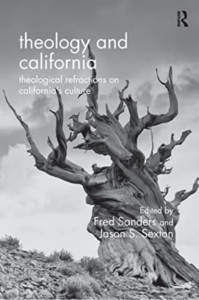
May 14, 2015
Munger Research Center, Seaver Classrooms, The Huntington
Author Jason Sexton discusses his book Theology and California: Theological Refractions on California’s Culture with ICW Director William Deverell. Theology and California explores California as a theological place. It asks questions about how theology might be able to meaningfully engage Californians in academic and public arenas, and whether there is a “theology of California” that may be discernible throughout the complex contours of California history and culture.
This conversation is part of a brown bag luncheon series sponsored by ICW.
-
Jason Sexton is a fourth generation Californian and Convener of the Theological Engagement with California’s Culture Project (TECC). He’s taught theology at the University of Cambridge as a Visiting Scholar and is currently Lecturer in the Honors Program at Cal State Fullerton and Research Associate at USC’s Center for Religion & Civic Culture. With Jon Christensen, he is guest editing a forthcoming issue of BOOM: A Journal of California (March 2016) on Religion in California.
Planet Ord
ICW In Conversation with Enid Baxter Ryce
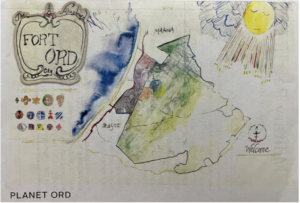
April 30, 2015
Munger Research Center, Seaver Classrooms, The Huntington
Once the largest military base in the American West and a vital center during the 20th century, Fort Ord is now decommissioned and slowly changing. The more than one million people who lived and worked at Fort Ord contributed to embedding the architectural remnants with layers of murals and evidence of their lives. “Planet Ord” is a multimedia art project that explores the contemporary experience and historical echoes of this abandoned city.
Documented by artist Enid Baxter Ryce in 2009, the Planet Ord project presents the contemporary landscape of Fort Ord, nearly twenty years after its closure, including thousands of graffiti murals painted by generations of soldiers, most of which have since been destroyed.
This conversation is part of a brown bag luncheon series sponsored by ICW.
-
Enid Baxter Ryce is an artist, filmmaker and musician whose investigations explore the relationships resonating in places between ecology and hidden histories. Her works have exhibited at venues such as the Smithsonian, Washington, D.C; the Museum of Contemporary Art, Los Angeles; Location One, New York; Sundance, Park City; The Arclight Theater, Los Angeles; The Kunsthalle Vienna, The Arnolfini in London; the Director’s Guild of America; Center for Contemporary Arts, Glasgow, CCA Andratx, Mallorca, and many others. Her work was featured in the Getty Museum’s retrospective of California Video, 1960-present. She received her BFA from The Cooper Union (1996), was a fellow at Yale University and received her MFA with a fellowship from Claremont Graduate University (2000). She is Associate Professor of Cinematic Arts and Environmental Studies and Chair of Cinematic Arts at CSU Monterey Bay. She lives and works on the former Fort Ord, with her husband Walter and their two children.
Alexander Von Humboldt and Scientific Exploration Of The American West
ICW In Conversation with Sandra Rebok
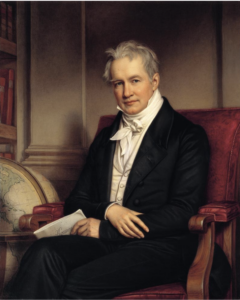
April 23, 2015
Munger Research Center, Seaver Classrooms, The Huntington
Sandra Rebok joins ICW Director William Deverell to talk about Alexander Von Humboldt and his expeditions through the Spanish colonies in Latin America and his journey to the United States and to meet with President Thomas Jefferson.
This conversation is part of a brown bag luncheon series sponsored by ICW.
-
Sandra Rebok’s research focuses on exploration voyages, intellectual networks and transnational collaborations during the 19th century. She has over 20 years of experience in Humboldtian scholarship, she is the author of several books on Humboldt and the editor of three of his works in Spanish. One of her recent books examines his intellectual exchange with Thomas Jefferson (Jefferson and Humboldt, 2014), while her forthcoming monograph, Humboldt’s Empire of Knowledge, analyzes Humboldt’s position between the Spanish Empire in decline and the expanding United States.
Indigenous and Decolonial Practices and Imaginaries Symposium
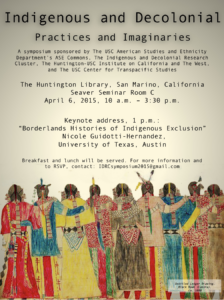
April 6, 2015
Munger Research Center, Seaver Classrooms, The Huntington
This one-day symposium will bring together local scholars from multiple academic institutions concerned with research around indigeneity and decolonization and a keynote address from Nicole Guidotti-Hernandez. This symposium makes an effort to bridge the work that faculty and students are doing at USC with the work being done at UCLA, UCR, Occidental College, and UCSD. A number of local students and faculty will be joining us in a field-building event that will help move our own academic work forward while also engaging critical tensions between the inter-disciplinary fields of Native American Studies, Decolonial Feminisms, Latina/o Studies, Indigenous Studies, Settler Colonial Studies, Transpacific Studies, and so forth.
This symposium is sponsored by The USC American Studies and Ethnicity Department’s ASE Commons, the Indigenous and Decolonial Research Cluster, Huntington-USC Institute on California and the West, and the USC Center for Transpacific Studies.
-
Dr. Nicole M. Guidotti-Hernández is Professor of English at Emory University. On fellowship at Harvard’s Charles Warren Center for American history during the academic year 2019-2020, Professor Guidotti-Hernández was a faculty member at UT Austin from 2012-2019 and the inaugural chair of the Department of Mexican American and Latina/o Studies. She started her academic career at the University of Arizona from 2003-2011.
Her book titled Unspeakable Violence: Remapping U.S. and Mexican National Imaginaries, Duke University Press (2011) was a finalist for the 2012 Berkshire Women’s History First Book Prize, won the MLA Chicana/o and Latina/o Prize in Literary and Cultural Studies for 2012. The book has received many favorable reviews.
She has published in journals such as Women’s Studies International Forum, ELN, Social Text, American Quarterly, Cultural Dynamics, Feminist Formations, The Latin Americanist, and Latino Studies, where her article “Dora the Explorer, Constructing ‘Latinidades’ and the Politics of Global Citizenship” is one of the most downloaded articles in the history of the journal. She is also the co-editor Radical History Review special issue number 123 entitled “Sexing Empire.”
2015 Whitsett Graduate Seminar & Lecture
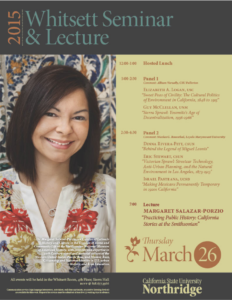
March 26, 2015
Sierra Hall, Whitsett Room, California State University, Northridge
The annual Whitsett Graduate Seminar in California History will showcase the strongest graduate work in a one-day seminar moderated by top scholars in fields related to California History. The seminar will include in-depth critique from the moderator and audience, who will have electronic access to the papers prior to the event. The seminar showcased Elizabeth Logan as one of the presenters, presenting her paper “Sweet Peas of Civility: e Cultural Politics of Environment in California, 1848 to 1915.” The seminar concluded with Margaret Salazar-Porzio giving a Whitsett lecture.
-
Elizabeth A. Logan received her undergraduate degree from Stanford University in History with honors, her JD from the UCLA School of Law, and her Ph.D. from the University of Southern California. She serves as the Associate Director of ICW and the Executive Director of the Los Angeles Service Academy (LASA). Her previous work includes positions as an Assistant Editor of Boom: A Journal of California and as a Dornsife Preceptor. Her teaching and work explores the intersections of law, history and culture in the 19th- and early 20th-century United States and American West.
-
Margaret Salazar-Porzio is a Curator of Latina/o History and Culture in the Division of Home and Community Life at the Smithsonian National Museum of American History. Her collecting and research interests include 20th century visual and material culture of the U.S.-Mexico borderlands; race, immigration and national identity in the United States; and K-20 education.
Salazar-Porzio has co-curated an exhibit on American cultural identity and immigration called Many Voices, One Nation, which opened in June 2017. She is lead editor of the exhibition book, Many Voices, One Nation: Material Culture Reflections on Race and Migration in the United States (Smithsonian Institution Scholarly Press, 2017), which was recently named one of CHOICE’s Outstanding Academic Titles for 2017. Dr. Salazar-Porzio also spearheads other projects including “Latinos and Baseball: In the Barrios and the Big Leagues,” which has grown from a collecting initiative with 30 partners in 14 states and Puerto Rico to a 1200 square foot exhibition opening in 2020.
Prior to joining the Smithsonian Institution, Salazar-Porzio earned her M.A. (2008) and Ph.D. (2010) in American Studies and Ethnicity from the University of Southern California. She served as an Associate Research Scholar and Lecturer at the Center for Institutional and Social Change at Columbia University Law School and received grants and fellowships from the Guggenheim, Rockefeller, and National Science Foundations. She combines her experiences growing up in Southern California with deep commitments to education, equality, and democratic engagement in the service of her work at the National Museum of American History.
Past Tense Seminar 2014-2015
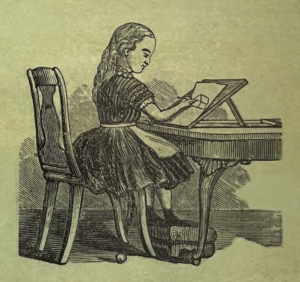
January 30, 2015 and February 20, 2015
Munger Research Center, Seaver Classrooms, The Huntington
Christopher Kyle talks about his work News Travels Fast? Learning About Information Networks From the Death of Queen Elizabeth. Susan Green talks about her work Editing History at The Huntington Library Press.
This programming is brought to you in partnership with the USC-Huntington Early Modern Studies Institute; Mellon Foundation; USC Dana and David Dornsife College of Letters, Arts, and Sciences; Linda and Harlan Marrens; and the Office of the Director of Research, The Huntington.
___________________________________________________________________________
In Conversation with Douglas Smith
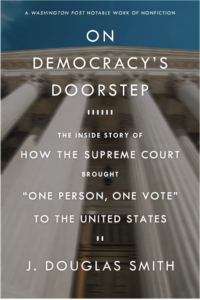
January 15, 2015
Munger Research Center, Seaver Classrooms, The Huntington
Legal scholar Jessica Levinson will talk with historian Douglas Smith about his new book, On Democracy’s Doorstep, recently published by Hill & Wang. As Chief Justice of the U.S. Supreme Court, Earl Warren is most often remembered for landmark rulings in favor of desegregation and the rights of the accused. But Warren himself identified a lesser-known group of cases–Baker v. Carr, Reynolds v. Sims, and their companions -as his most important work. Smith’s On Democracy’s Doorstep masterfully recounts the tumultuous and often overlooked events that established the principle of “one person, one vote” in the United States.
This conversation is part of a brown bag luncheon series sponsored by ICW.
-
Douglas Smith is Director of Humanities at the Colburn School of Music and Executive Director of the Los Angeles Service Academy. He is the author of Managing White Supremacy: Race, Politics, and Citizenship in Jim Crow Virginia, which received the 2003 Library of Virginia Literary Award in Nonfiction.
-
Jessica Levinson’s work focuses on constitutional law, the law of the political process, including election law and governance issues, and the Supreme Court.
Levinson is a legal contributor for CBS News, a columnist for MSNBC, and has a weekly legal segment on NPR member station KCRW. She regularly appears as a legal and political expert on television, radio, podcasts, online outlets, and in print.
Levinson is the founding director of Loyola Law School’s Public Service Institute, which is dedicated to creating the next generation of leaders in government service. She is also the director of Loyola Law School’s Journalist Law School.
Levinson served as the President of the Los Angeles Ethics Commission. She was appointed by the Los Angeles City Controller in 2013 to serve a five-year term.